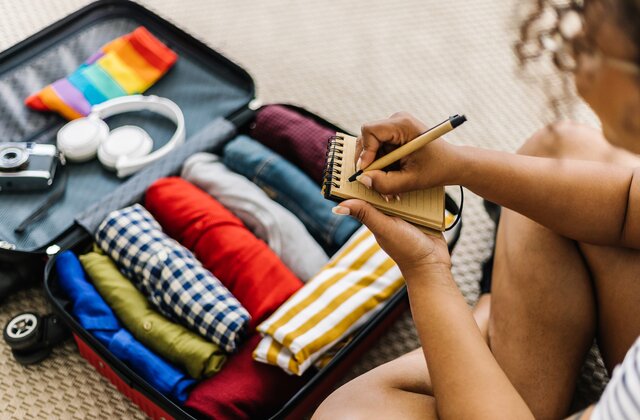Traveling in a World of Inflation in 2023: A Comprehensive Guide
Inflation is on the rise, and travelers across the world are grappling with its impacts. With soaring prices and the eroding value of money, planning a trip might seem like an uphill battle. However, with the right strategies, you can navigate the choppy waters of inflation and enjoy your travels without breaking the bank. Here’s a detailed guide to help you travel smart in a world of inflation in 2023.
Plan and Book Early
The early bird catches the worm. As inflation makes travel more expensive over time, planning your trip early can help you avoid the sting of rising prices. By booking flights, accommodation, and tours well in advance, you can lock in lower rates before inflation takes hold. Consider setting up price alerts and subscribing to newsletters from airlines, hotels, and travel agencies to snag the best deals as they become available.
Be Flexible with Your Travel Dates
Traveling during the off-peak season can significantly reduce costs. Flights, accommodations, and attractions are often cheaper when demand is lower. Research the best times to visit your desired destination, keeping an eye out for local events or holidays that might drive up prices. Being flexible with your travel dates will help you find the most affordable options and avoid the crowds.
Consider Alternative Accommodations
With inflation affecting the hospitality industry, hotel prices can be sky-high. Consider alternative accommodations such as hostels, vacation rentals, or even Couchsurfing. These options can offer a more authentic and affordable experience. Look for well-reviewed hosts and ensure the location is convenient for your planned activities.
Eat Like a Local
Tourist-oriented restaurants tend to be pricey, especially during inflationary periods. Embrace local cuisine by eating at smaller, family-run establishments, street food vendors, or local markets. You’ll not only save money but also enjoy a more authentic culinary experience. Consider cooking your meals if your accommodation has a kitchen.
Use Public Transport
Renting a car, taking taxis, or using rideshare services can add up quickly. Opt for public transportation options like buses, trains, or subways to save money while traveling. Research the local transportation system, get a transit pass if available, and familiarize yourself with routes and schedules.
Prioritize Free or Low-Cost Activities
You don’t have to spend a fortune on attractions and activities to enjoy your trip. Many destinations offer free or low-cost things to do, such as museums, parks, or hiking trails. Look for free walking tours, concerts, or festivals that showcase local culture without draining your wallet.
Protect Your Finances
Inflation can cause currency exchange rates to fluctuate unpredictably. Using a travel credit card with no foreign transaction fees or a prepaid travel card can help protect your finances from volatile currency markets. Additionally, ensure you have a comprehensive travel insurance policy to cover unexpected expenses, such as medical emergencies or trip cancellations.
What makes a good travel insurance policy?
A good travel insurance policy should provide comprehensive coverage for a range of situations that may arise while traveling, offer reasonable pricing, and come with responsive customer service. Here are some essential factors to consider when evaluating travel insurance policies:
- Coverage: A good policy should cover a broad range of scenarios, including medical emergencies, trip cancellations or interruptions, lost or delayed baggage, travel delays, and emergency evacuations. Make sure to read the fine print to understand what’s included and any exclusions or limits.
- Medical Coverage: Ensure that the policy offers adequate medical coverage for both emergency and non-emergency situations. This should include hospitalization, treatment, medications, and emergency evacuation if necessary. If you have pre-existing conditions, check whether the policy covers them.
- Trip Cancellation and Interruption: The policy should cover non-refundable expenses if you need to cancel or interrupt your trip due to unforeseen circumstances like illness, natural disasters, or family emergencies. Check the terms and conditions to understand the valid reasons for cancellation or interruption.
- Baggage and Personal Belongings: The policy should provide coverage for lost, stolen, or damaged baggage and personal items. Check the limits, as some policies may have low maximum payouts or exclude certain items like electronics or jewelry.
- Travel Delays: A good policy should cover additional expenses incurred due to travel delays, such as accommodation and meals. Make sure to check the minimum delay time required for coverage to apply.
- Emergency Assistance: Look for policies that offer 24/7 emergency assistance. This can be invaluable in case you need help finding medical care, arranging evacuation, or dealing with other emergencies while abroad.
- Flexibility and Customization: A good policy should allow you to customize coverage based on your specific needs, such as adding extra coverage for adventurous activities, extending the policy duration, or covering multiple trips with an annual policy.
- Cost: Compare the cost of different policies and consider the coverage they offer. While it’s essential to find an affordable option, don’t sacrifice coverage for a lower price. Ensure you’re getting good value for your money.
- Reputable Provider: Choose a reputable insurance provider with a track record of reliable service, prompt claims processing, and positive customer reviews. Check their ratings with independent agencies like AM Best or Standard & Poor’s.
- Ease of Claim Process: A good travel insurance policy should have a straightforward and transparent claims process. Check the provider’s guidelines for filing claims, required documentation, and the expected timeline for resolution.
- Policy Exclusions and Limitations: Be aware of any exclusions or limitations in the policy, such as specific activities not covered, maximum coverage limits, or pre-existing condition exclusions. Make sure the policy aligns with your travel plans and activities.
- Review Period: Some policies offer a review period, allowing you to cancel the policy and get a refund if you change your mind within a specified timeframe.
Travel with a Group
Traveling with friends or family can help you save money by splitting costs for accommodations, transportation, and meals. Moreover, group tours often offer discounts for larger parties, making it a win-win situation.
Leverage Loyalty Programs and Rewards
To leverage loyalty programs and rewards while traveling in 2023, sign up for multiple loyalty programs, including those from airlines, hotels, car rental companies, and credit card providers. This allows you to earn rewards from a variety of sources and maximize your benefits. When booking, make sure to go through the official websites of these providers to ensure you earn loyalty points and gain access to exclusive deals.
Familiarize yourself with the terms and conditions of each program, including points expiration, blackout dates, and redemption options, to make informed decisions. Use co-branded credit cards linked to travel rewards programs to earn bonus points and enjoy perks like priority boarding and lounge access. Keep an eye on bonus offers or promotions within your loyalty programs to boost your rewards. If you lack enough points for full redemption, consider combining points with cash or transferring points between programs to reach higher reward tiers. Finally, make use of partnerships with non-travel businesses to continue earning points on the go, and don’t forget to share any perks or benefits with your travel companions to enhance their experience as well.
Pack Smart
Baggage fees can add up quickly, especially with inflation pushing prices higher. Pack light to avoid extra charges and ensure you have essentials like a reusable water bottle, snacks, and any necessary medications. This way, you’ll be prepared and won’t need to make expensive last-minute purchases. Packing smart during times of inflation is crucial, as it can help you save money, time, and stress. Here are some tips to pack efficiently and economically:
- Plan Ahead: Research your destination’s weather, culture, and activities. Create a packing list based on your specific needs and stick to it to avoid over-packing.
- Mix and Match: Pack versatile clothing that can be easily mixed and matched to create different outfits. Choose neutral colors that can be paired with various accessories to change up your look.
- Layer Up: Instead of packing heavy coats or sweaters, opt for lightweight layers that can be added or removed as needed. This approach is especially useful for destinations with varying weather conditions.
- Travel-Size Toiletries: Bring travel-size toiletries to save space and weight in your luggage. Alternatively, purchase refillable containers and fill them with your preferred products.
- Limit Shoes: Shoes can be bulky and heavy, so limit your options to a few essential pairs that can be used for multiple occasions. Consider packing versatile shoes that can be dressed up or down.
- Pack Light: Airlines often charge extra for overweight or oversized luggage, especially during inflationary times when prices are higher. Stick to carry-on luggage if possible and pack only what you need.
- Multi-Use Items: Pack items that serve multiple purposes, like a sarong that can be used as a beach towel, blanket, or cover-up. This will help you save space and money.
- Roll, Don’t Fold: Rolling clothes instead of folding them can save space in your suitcase and prevent wrinkles. Use packing cubes or compression bags to further optimize space and organization.
- Avoid Last-Minute Shopping: Inflation can lead to higher prices for everyday items. Avoid last-minute shopping at your destination by ensuring you have everything you need before departure.
- Limit Souvenirs: Souvenirs can add extra weight and costs to your trip. Consider purchasing small, lightweight, and meaningful souvenirs that won’t break the bank.
- Snacks and Water: Bring reusable water bottles and snacks from home to avoid paying inflated prices at airports or touristy areas.
- Digital Entertainment: Instead of packing physical books or magazines, load up your tablet or e-reader with digital entertainment to save space and weight.
- Travel Insurance: During inflationary times, travel insurance becomes even more critical. Make sure you’re covered for medical emergencies, trip cancellations, or lost belongings to avoid additional costs.
- Travel Light, Spend Wisely: Inflation can make traveling more expensive, so it’s essential to be mindful of your spending. Pack smart, plan ahead, and prioritize your needs to enjoy your trip without breaking the bank.
Conclusion
Traveling in a world of inflation might seem daunting, but with careful planning and smart choices, it’s still possible to explore the world on a budget. By being flexible, embracing local culture, and taking advantage of deals and loyalty programs, you can enjoy unforgettable experiences without feeling the pinch of inflation. Remember, travel is about creating memories and immersing yourself in new cultures. Don’t let inflation hold you back from the adventures that await you. So pack your bags, plan wisely, and set off on your next journey with confidence.





